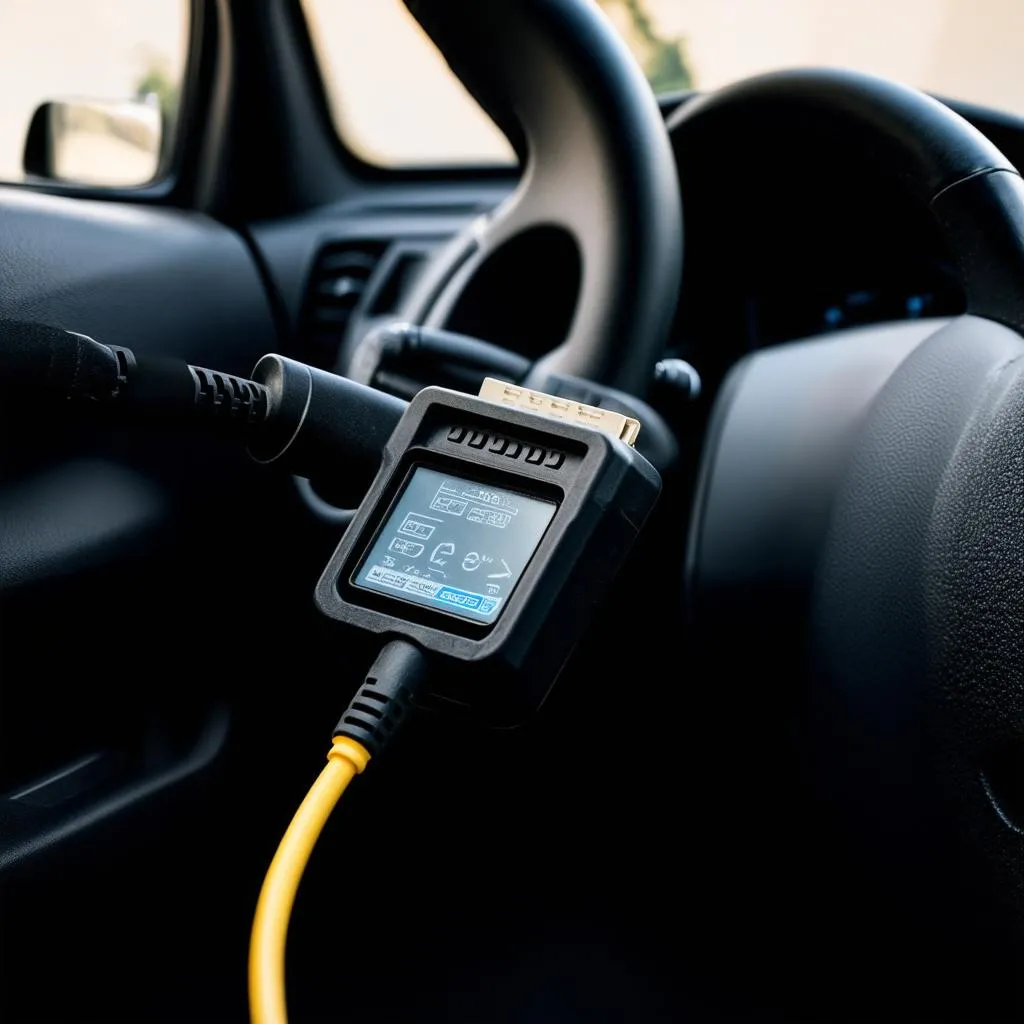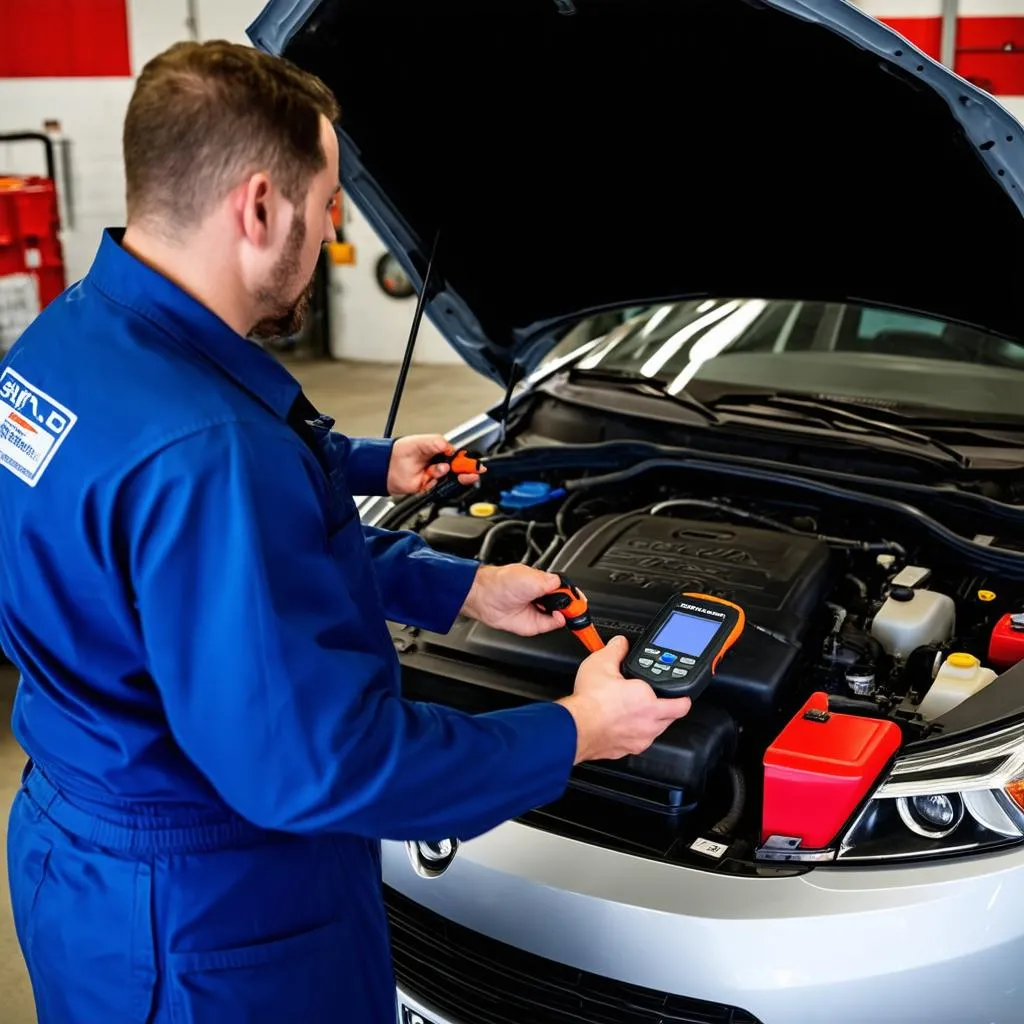You’re driving down a California highway, the sun is setting, and your favorite song plays on the radio. Suddenly, you hear a strange knocking sound coming from your engine. You pull over, heart sinking. Is this the dreaded engine knock everyone warns about? You pull out your trusty OBD doctor, hoping for a quick answer. But can an OBD doctor actually scan for knock? Let’s dive in and find out!
Understanding the Question: “Can Obd Doctor Scan Knock?”
This seemingly simple question actually has layers, like a perfectly baked German chocolate cake (okay, maybe not as delicious, but you get the point!). To understand it fully, we need to unpack it from different perspectives:
The Mechanic’s Perspective: Mechanics often use the term “OBD doctor” interchangeably with OBD-II scanners. These handy devices connect to your car’s computer (the Engine Control Unit or ECU) and read diagnostic trouble codes (DTCs). Mechanics want to know if these codes can pinpoint knock issues.
The Technical Perspective: We need to understand how knock sensors and OBD-II systems work. Do they communicate? Can the OBD-II system interpret signals from the knock sensor?
The Car Owner’s Perspective: Ultimately, car owners want to know if their OBD doctor can help them diagnose and prevent potentially expensive engine damage from knock.
So, Can an OBD Doctor Scan for Knock?
The answer, like many things in life, is… it depends.
Here’s the deal: While some advanced OBD-II scanners can detect knock sensor circuit issues (like a faulty sensor or wiring problem), they don’t usually directly “hear” the knock itself.
Think of it this way: Imagine your knock sensor is like a microphone listening for engine knock. It sends a signal to the ECU, which acts like the brain of the car. Now, the OBD-II scanner is like a doctor checking the brain’s electrical activity. The doctor can see if the microphone (knock sensor) is sending a signal but might not be able to hear the actual noise it’s picking up.
However, don’t despair! Just because an OBD doctor might not directly “hear” the knock doesn’t mean it’s useless. Here’s how it can still help:
- Detecting Knock Sensor Problems: Your OBD doctor can detect problems with the knock sensor circuit itself. This means it can tell you if the sensor is malfunctioning or if there’s a wiring issue preventing the signal from reaching the ECU.
- Finding Related Codes: While not always a surefire sign, certain engine performance codes, like those related to timing or misfires, can sometimes indirectly point towards a potential knock issue.
When Your OBD Doctor Isn’t Enough:
Sometimes, your trusty OBD doctor might not be enough to diagnose a knock.
Here are some scenarios where you’ll need a more specialized approach:
- Intermittent Knock: If the knocking is intermittent and doesn’t trigger a DTC, your OBD doctor might not catch it.
- Specific Knock Detection: Some cars have very sensitive knock detection systems that rely on specialized software and equipment beyond the scope of a standard OBD-II scanner.
In these cases, it’s best to consult a qualified mechanic, especially one familiar with your car’s make and model. They have access to advanced diagnostic tools and expertise to accurately diagnose and address engine knock.
FAQs about OBD Scanners and Knock Sensors
Here are some frequently asked questions about this topic:
- Can a bad knock sensor cause knocking? Not directly. A bad knock sensor can’t cause knock, but it can prevent the ECU from detecting and adjusting for it, potentially leading to engine damage.
- What are the symptoms of a bad knock sensor? Common symptoms include engine knocking, decreased fuel efficiency, sluggish acceleration, and the check engine light illuminating.
- Can I drive with a bad knock sensor? It’s not recommended. Driving with a faulty knock sensor can lead to serious engine damage over time. It’s best to get it diagnosed and fixed ASAP.
Beyond the Scan: Tips for Dealing with Potential Knock
Remember, early detection is key to preventing costly engine damage. Here are some additional tips:
- Listen to your engine: Pay attention to any unusual knocking or pinging sounds, especially under load or acceleration.
- Use quality fuel: Using the recommended octane rating for your car can help prevent knock.
- Regular Maintenance: Regular tune-ups, including spark plug replacements and fuel system cleaning, can contribute to optimal engine performance and minimize knock risk.
 OBD Scanner
OBD Scanner
 Mechanic
Mechanic
Need More Help with Your Car’s Diagnostics?
We understand that car troubles can be frustrating. If you’re unsure about your car’s health or need assistance with diagnostic tools, don’t hesitate to reach out. Our team of auto experts is available 24/7 to answer your questions and provide guidance. Contact us on WhatsApp at +84767531508, and let’s get your car back in tip-top shape!
Keep Exploring the World of Car Tech
Want to learn more about OBD-II scanners, knock sensors, or other car tech topics? Check out these related articles on our website:
Remember, knowledge is power when it comes to car care!